Reviewed by Deanna Birkholm
When A.K. Best first wrote Production Fly Tying
in 1989 he probably did not expect to do an updated version
some ten years ago - nor did he expect his experitise would
become the pattern other fly tiers would follow for years.
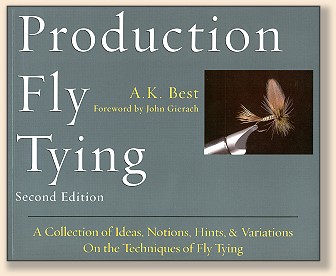
While most tiers will not produce the number of flies in
their lifetime A.K. has produced in a single year, there is
a great deal to be learned from tying the same pattern
hundreds of times. He calls the new 2nd Edition, "A
collection of Ideas, Notions, Hints, & Variations On the
Techniques of Fly Tying. It's more than that.
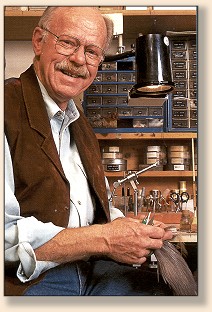 New materials require new methods - methods which A.K.
breaks down into managable pieces to make your tying
easier and more fun. Old habits are hard to break - but
many of the steps in fly tying are based on what and how
early tyers did hundreds of years ago. We've come a long
way because of the writings of A.K. Best.
New materials require new methods - methods which A.K.
breaks down into managable pieces to make your tying
easier and more fun. Old habits are hard to break - but
many of the steps in fly tying are based on what and how
early tyers did hundreds of years ago. We've come a long
way because of the writings of A.K. Best.
Quoting him in the Afterword of the new Production Fly Tying,
". . .Fooling the fish is the first and most important
consideration. Human opinions matter very little in this
respect. From the fish's point of view, your fly is or is
not edible. Presentation, the drift, proper action, and
retrieve are all important, but if the fly isn't right to
the fish, you lose.
I don't pretend to think I know all there is to know about
tying flies. I just tie a lot of them (and for a lot of very
nice people) and have tried to make the job even more fun than
it is by its very nature. In approaching it that way every day,
I constantly look for new techniques, materials, and ideas that
just might make a small difference both in the fly's effectiveness
and in its ease of tying. It seems like I learn something new
every week - tiny things; tiny things do catch trout."
I asked A.K. if he would like me to feature any part of the
book specifically (other than saying the color photography
is wonderful) and he suggested we use his single hackle collar
method. What follows is NOT the complete text, but I hope
enough to give you a feel for what the author has to say.
Please note, the photos for the most part are less than
one half of the actual size in the book.
Single Hackle Collar
"What follows is how I hackle all my dry flies when only a single
hackle color is required. Use only the longest hackles you have.
I like to get a least seven turns of hackle on a size 16 dry
fly - three turns behind the wing and four in front. One a size
18, I make five or six turns, with two turns behind the wing and
three or four in front. On a size 20, I like only five turns,
with two turns behind the wing and three in front. On size 14
flies, I like three turns behind the wing and five or six in front
for a total of eight or nine total turns of hackle. I always
double-hackle all size 12 dry flies: three turns of hackle
behind the wing and five or six in front of the wing with the
first hackle, and two turns behind and six or seven in front with
the second hackle for a total of a minimum of sixteen turns of
hackle. Remember, the size 12 hook is a lot of wire to float. Not
only that, the larger flies are often fished in less-than-optimum
conditions. In all cases (single or double hackle), I shoot for
one-third hackle behind the wing and two-thirds in front of the
wing.
I prefer a hackle feather about about as much web as shown in the
photo 237" [below].
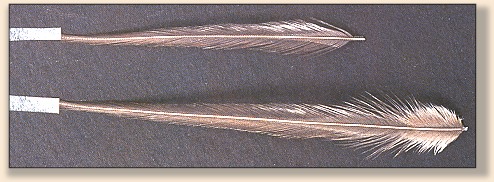
Unclipped hackle feather (bottom) and trimmed, read-to-use hackle (top)
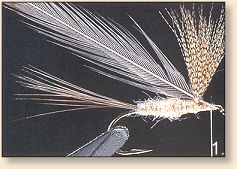
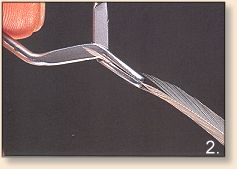
1. Detail of hackle feather tie-in.
2. Proper hackle plies grip.
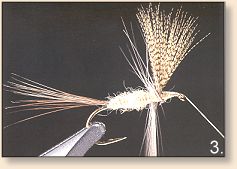
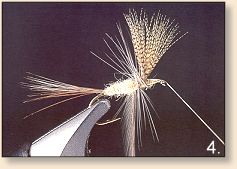
3. First turn of twisted hackle.
4. Second turn of hackle.
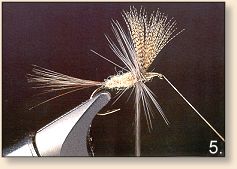
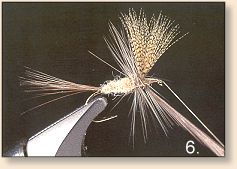
5. Third turn in the middle of the first two.
6. Crossing hackle forward beneath the fly.
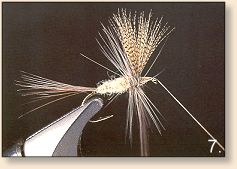
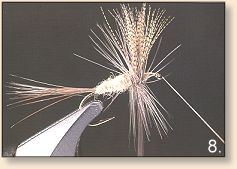
7. Fourth turn (first turn in front of wings).
8. Second turn in front of wings.
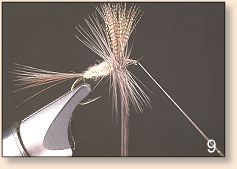
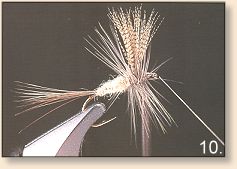
9. Third turn in front of wings.
10. Completed hackle collar.
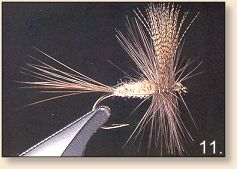
11. Finished Fly.
There of course is complete text instruction to go with the photos
shown, but I wanted you to see how complete the color photos actually
are.
It doesn't matter if you are new to fly tying - or an accomplished
tyer, there is plenty to learn from the Second Edition. Highly
recommended. ~ DLB
Production Fly Tying, 2nd Edition
A.K. Best
Soft cover 148 pages, all color
Size: 9" x 10 1/2"
Pruett Publishing Company
Boulder, Colorado
$39.95 US
ISBN 0-87108-929-7
Previous Reviews
|




 New materials require new methods - methods which A.K.
breaks down into managable pieces to make your tying
easier and more fun. Old habits are hard to break - but
many of the steps in fly tying are based on what and how
early tyers did hundreds of years ago. We've come a long
way because of the writings of A.K. Best.
New materials require new methods - methods which A.K.
breaks down into managable pieces to make your tying
easier and more fun. Old habits are hard to break - but
many of the steps in fly tying are based on what and how
early tyers did hundreds of years ago. We've come a long
way because of the writings of A.K. Best.








